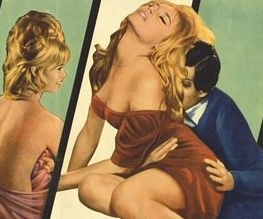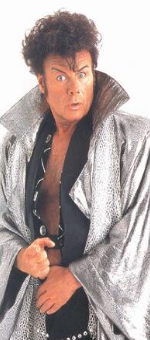Gainsbourg (Vie Héroïque)

This film has been a long time coming. After eighteen years of rumoured biopics and directors who decided that legendary artist Serge Gainsbourg’s life was too risky a project, Gainsbourg has finally been written and directed by Joann Sfar, a leading French comic book artist. Rather than risk antagonising Serge’s vociferous fans and detractors with a ‘straight’ portrayal, Sfar has adapted his graphic novel based on the musician’s life into a film which frequently strays into fantasy and is more a fable than a biopic. It has no wish to match the accuracy of films like Ray and Sex & Drugs & Rock & Roll, focusing on conveying the essence of Serge rather than the specifics. In that respect, this Gainsbourg biopic is superb.
[FLOWPLAYER=http://uk.image-1.filmtrailer.com/36444.jpg|http://uk.clip-1.filmtrailer.com/3773_13545_a_4.flv,275,180]
Gainsbourg: The ugly boy
The film opens on the young Lucien Ginsburg (Serge Gainsbourg was a nom de scène) having two experiences which define the rest of his life as we see it. He is rejected by a girl because of his unusual looks – “Can I hold your hand?” “No, you’re too ugly!” – and immediately afterwards finds his first cigarette end on the beach. These themes of self-doubt and self-destruction are maintained throughout the film – Serge, who constantly mocks his own features, is never, ever seen without a pall of Gauloise smoke drifting across the lens. Flitting through key moments in Lucien’s early life as a Jew in occupied Paris, we are well acquainted with Ginsburg the boy before exploring Gainsbourg the man (uncannily played by virtual unknown Eric Elmosnino).
Following his origins as a fine artist, early success as a songwriter and eventual transformation into a genre-spanning musical icon, Gainsbourg speeds through forty turbulent years by focusing not on the everyday Serge but the mythos surrounding the legendary artiste, ivrogne and séducteur – we are treated to only his most well-known tunes and his most infamous affairs. I guarantee you’ll recognise enough songs to appreciate their connection to the story – ‘Bonnie and Clyde’ and ‘Je t’aime… moi non plus’ are used beautifully to focus his relationships with, respectively, Brigitte Bardot and Jane Birkin, whilst the notorious ‘Aux armes et cætera’, a cover of La Marseillaise, serves to illustrate that public opinion turned viciously against Serge as frequently as it lauded him.
Without doubt, the most captivating conceit in the film is ‘La Gueule’ or ‘The Mug’, the Mr Hyde-type character who is visible only to Gainsbourg and accompanies him through the film as a hyper-visual illustration of his doubts and conflicted nature. A grotesque caricature emphasising the ears which earned him the nickname ‘The man with a cabbage for a head’ and his stereotypically Jewish nose, La Gueule is conjured into life by a cartoon Lucien draws as a boy and constantly reappears throughout the film. By turns compassionate – he brings a satchel of cigarettes to Serge’s hospital bed – and vicious in his criticism of Serge’s failings, he is brought to life by the extraordinary Doug Jones, best known for portraying both the Faun and the Pale Man in the esoteric Pan’s Labyrinth. His performance as the devil on Serge’s shoulder is arguably even more arcane and beguiling than either.
Gainsbourg: An Impressionist sketch of an unforgettable character
Some viewers of the Gainsbourg film will doubtless crave more detail, and I certainly wished for a smoother and less opaque ending. A biopic it absolutely is not, and it flaunts its preference of style over substance, but these things simply do not matter when held up against the sheer beauty of this film. An exquisitely constructed window into the life of a musical icon, Gainsbourg gives us Serge exactly as we imagine him – inspired, tormented and endlessly chic. Anything more prosaic would have been anathema to a man who lived as he smoked – by turns languidly and violently, but always with relish and a complete disregard for the rest of the world. Praiseworthy? Perhaps not, but he could hardly be more memorable.






Recent Comments